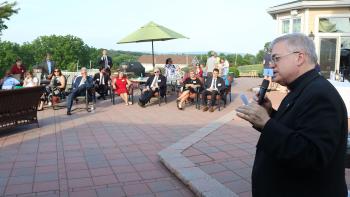What is the position of the Catholic Church on critical issues such as in vitro fertilization (IVF), frozen human embryos, prenatal adoptions, high-risk pregnancies, and end-of-life decisions? These were some of the sensitive issues under consideration at this event.
The home of Bob and Mary Wert became a hub of ethical discourse on June 19, hosting “An Evening with the National Catholic Bioethics Center” (NCBC). The event featured presentations by Bishop Alfred Schlert; Dr. John Haas, President of NCBC; Dr. Joseph Meaney, Past President and Senior Fellow of NCBC; and Dr. John DiCamillo, an ethicist at the center.
NCBC’s primary role is addressing the ethical dimensions of modern medical advancements and supporting the Catholic community in making informed, morally sound decisions.
It makes every effort to remain faithful to the magisterial teachings of the Church, with two Church documents that provide guidance: “Ethical and Religious Directives for Catholic Health Care Services” (2018) by the Committee on Doctrine of the U.S. Conference of Catholic Bishops (USCCB), and “Dignitas Personae” (2008) by the Church’s Congregation for the Doctrine of the Faith.
“The Catholic Health System is guided by these documents, but they themselves need help in overseeing this health industry and often turn to us to help them in the application of these directives,” said Haas. “The task of all of us is to get ourselves and our loved ones into heaven. And that’s a task also for Catholic healthcare…. We’re there to assist the bishops in their primary task of fulfilling that obligation on their part for their faithful.”
DiCamillo pointed out that the center has resources and publications on many medical ethical issues: “We’re not like a grassroots pro-life organization. We’re also not a science organization as such. So we go to the science, and we look to other groups that offer the science.”
Participants discussed adopting frozen embryos, a topic that DiCamillo said is highly debated in Catholic bioethics. “On the pro side, advocates argue that adopting embryos aligns with pro-life principles, as it offers a chance for these embryos, considered lives, to develop and be born, reflecting a principle of charity and justice. On the con side, opponents highlight the immorality of in vitro fertilization and frozen storage. They emphasize that pregnancy is an integral part of motherhood, ideally within the marital bond, making embryo adoption problematic,” he said.
“The Catholic Church has not reached a definitive stance on embryo adoption. The document ‘Dignitas Personae’ states that using frozen embryos to treat infertility is impermissible, but acknowledges the noble intention behind embryo adoption. It labels the situation of cryopreserved embryos as an injustice that cannot be resolved, though this doesn’t fully close the door on embryo adoption. The document’s nuanced language reflects ongoing debate and diverse perspectives within the Church. Therefore, while embryo adoption remains controversial, it is not entirely ruled out.”
In answer to a question, DiCamillo noted that “sometimes a bishop will call us and say, ‘could you please talk with senators such and such about this issue because they need some clarification, etc.’ We also had different elected representatives come to us, ask us to testify, particularly when it comes to questions like in vitro fertilization or any other legislation that’s coming forward… We’ve also been called by state legislatures and D.C. as well … we also do private consultation for staff members.”
Meaney added that this consultation is critical since “there are some politicians who cannot define what a woman or a man is.”
“We have a good mix of people here tonight, quite a few priests, obviously, our dedicated staff from our hospitals, the doctors, surgeons, educators,” said Bishop Schlert in his remarks. “Let’s remind ourselves that the dignity of every human person should be at the center of all that we do.”








